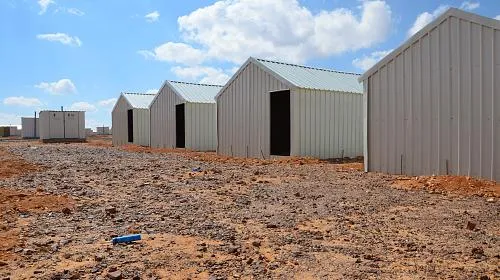Amman, Jordan – CARE is ready to provide much needed support to newly arrived refugees when they reach Azraq camp, Jordan’s sixth Syrian refugee camp. Azraq camp will start receiving refugees after the 21st of April whilst the camp’s official opening day is on the 30th of April.
There are nearly 600,000 registered Syrian refugees in Jordan, while the Government of Jordan estimates that there are one million Syrians in the country. With the Za’atari refugee camp, which currently accommodates around 100,000 refugees, running out space and the urban areas already under strain as refugees and host communities battle with increased accommodation and living costs, and access to outstretched public services, the new camp will provide vital life-saving assistance and protection to an initial 51,000 refugees. The site could be expanded to support 130,000 refugees in total if needed.
“CARE has found that the social and psychological impact of war on families is increasingly worrying. 36 percent of the Syrian refugee families registered with CARE’s urban refugee centres are headed by women. Female refugees, especially those fleeing Syria without their husbands are particularly vulnerable. Apart from the many challenges Syrian refugee women face – isolation, protection issues – we have also found that women usually prioritise the health and well-being of their children and husbands over their own, and they are often the last ones to ask for health or psychological support. Our community centres and friendly spaces in Azraq camp will provide a safe haven for vulnerable refugees, including women, as they will be able to receive psychosocial support, engage in recreational activities as well as learn new skills, such as how to cope with stress or parenting skills. Our centres will also act as internet hubs, enabling refugees to connect with the outside world and stay in touch with their families, and helping to reduce isolation,” said Salam Kanaan, CARE Jordan Country Director.
CARE’s trained ‘roving’ staffers will identify the most vulnerable cases (with special focus on female-headed households, the elderly, the disabled, single men and at-risk youth), and provide case management and follow-up to ensure that they can access essential services and receive the support that they need. CARE will also prioritise discussions on protection issues related to women and girls in its activities.
“There are important lessons learnt from Za’atari camp about community ownership and their involvement in the management of the camp. CARE will be working closely with the refugees, identifying community leaders and setting up committees so that refugees are empowered, can voice their concerns and be part of the management of the camp. It is also essential that everyone’s voice is heard. We will identify both women and men community leaders so that the specific needs and concerns of various groups are raised and addressed appropriately. The refugee representatives will not only help developing a well-functioning, supportive community but will also help ensuring the well-being, dignity and safety of the camp’s residents,” said Kanaan.
CARE works closely with the UN and other humanitarian agencies and its friendly spaces can be used for anything that’s needed – for social gatherings, therapeutic support, workshops, prayer, training or information dissemination.
CARE Jordan has extensive experience providing community services to refugees, and has been running successful programmes for Syrian and Iraqi refugees living in urban settings for more than a decade. CARE has helped more than 250,000 Syrian refugees through its four urban community centres (East Amman, Zarqa, Mafraq and Irbid, and via its two partner organizations in Azraq town). In the region, CARE’s provision of life-saving services to Syrian refugees and host communities in Jordan, Lebanon and Egypt has reached more than 290,000 people.
About CARE
Founded in 1945, CARE is a leading humanitarian organization fighting global poverty and providing lifesaving assistance in emergencies. CARE places special focus on working alongside poor girls and women because, equipped with the proper resources, they have the power to help lift whole families and entire communities out of poverty. CARE has been working in Jordan since 1948. CARE Jordan has extensive experience working with refugees, providing livelihood training and opportunities, emergency cash assistance, information sharing and psychosocial support to Iraqi refugees since 2003.
Media contacts
Johanna Mitscherlich (Amman), +962 775442241, Johanna.Mitscherlich@jo.care.org

